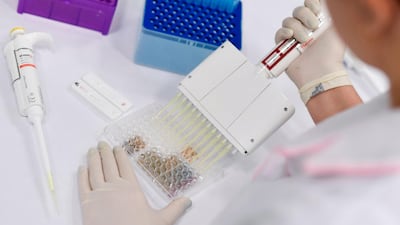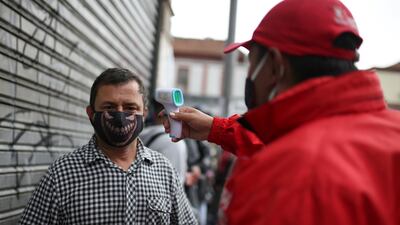A new treatment for Covid-19 has produced encouraging early results in trials on patients in the UK.
While still preliminary, the findings suggest that patients are more than twice as likely to recover from infection after inhaling a form of interferon beta (IFN-beta), a protein used by the body’s virus-fighting system.
Patients also had a lower risk of developing severe disease, needing ventilation, suffered less breathlessness and also spent significantly less time in hospital.
The results – which have yet to be published in a peer-reviewed journal – “could signal a major breakthrough”, according to Synairgen, the drug research company in Southampton, UK, which developed the treatment.
"We couldn't have expected much better results than these,” Richard Marsden, the company's chief executive, told the BBC.
He said his company was about to present its work to medical regulators in the first step towards having the treatment approved for use.
One major caveat about the findings is that they come from a relatively small study of 101 patients.
As a result, the evidence of benefit still carries considerable uncertainty. Some of the findings are also only barely statistically significant, the minimum standard needed to be taken seriously by regulators.
Nevertheless, the results to date suggest the treatment could be a “game changer”, according to Professor Tom Wilkinson of the University of Southampton, who organised the clinical trial across nine UK hospitals.
These were so-called double-blind randomised placebo-controlled trials, meaning both patients and doctors were unaware of who received the treatment or an inactive placebo, and that other forms of bias had been minimised. Such trials are regarded as the most reliable way of testing a new treatment.
The results are also consistent with what is known about IFN-beta. Naturally produced by the body’s immune system, this protein orchestrates the response to viral infections.
Since Covid-19 first emerged last December, studies have shown that older people and those with chronic health conditions – two of the most vulnerable groups of Covid-19 patients – also have relatively low IFN-beta levels.
It is also known that coronaviruses – including Sars-CoV-2, responsible for Covid-19 – can suppress the production of the protein.
This has led researchers to suspect that giving patients IFN-beta following infection could improve the chances of survival.
Promising results with patients with Sars and Mers led the World Health Organisation to include IFN-beta in its list of potentially useful treatments for Covid-19 when used with other drugs. However, there has been concern that its effectiveness depends on how it is administered.
Remarkably, the new results suggest IFN-beta is highly effective if simply inhaled via a nebuliser. Previous studies of patients with asthma and other breathing disorders also suggest the treatment is safe and does not interact with many other drugs. It may also be effective in combating the virus soon after infection.
Combined with the urgent need for such treatment, it is likely that Synairgen will win emergency approval for the therapy.
The company is understood to have begun production several months ago in anticipation of the positive results, and aims to deliver hundreds of thousands of doses by the winter.
“Our efforts are now focused on working with the regulators and other key groups to progress this potential Covid-19 treatment as rapidly as possible”, said Mr Marsden.
Robert Matthews is Visiting Professor of Science at Aston University, Birmingham, UK



















